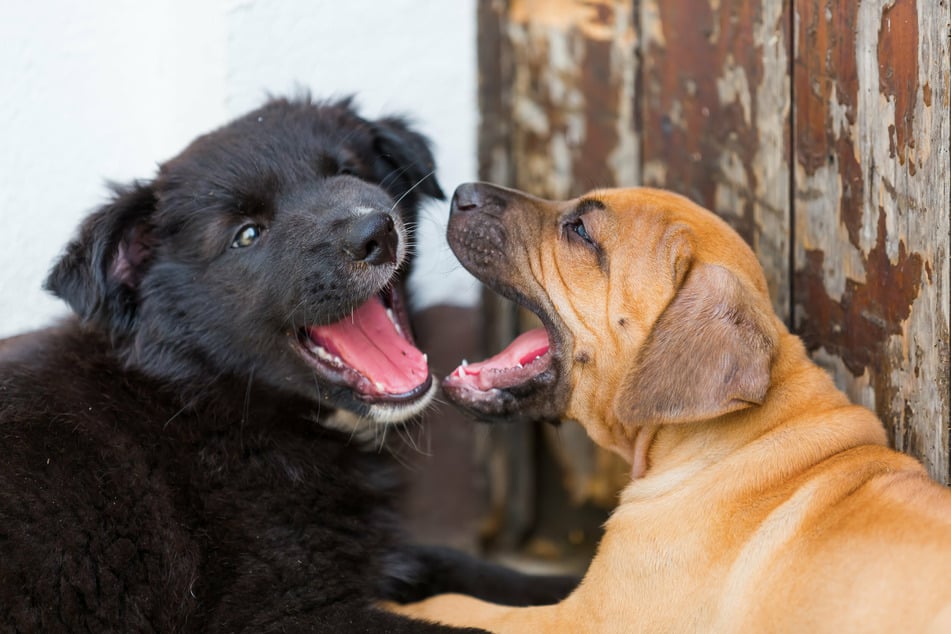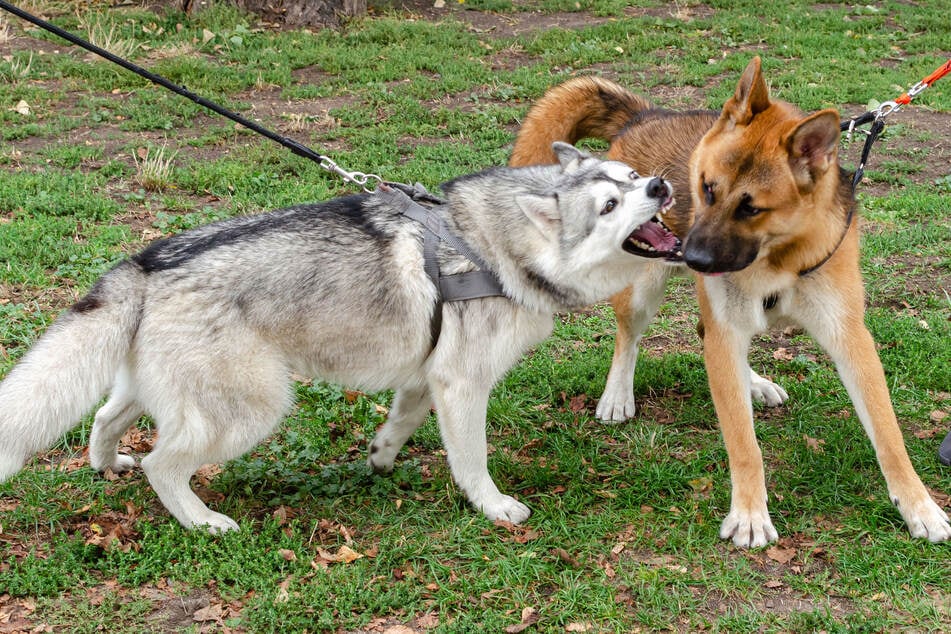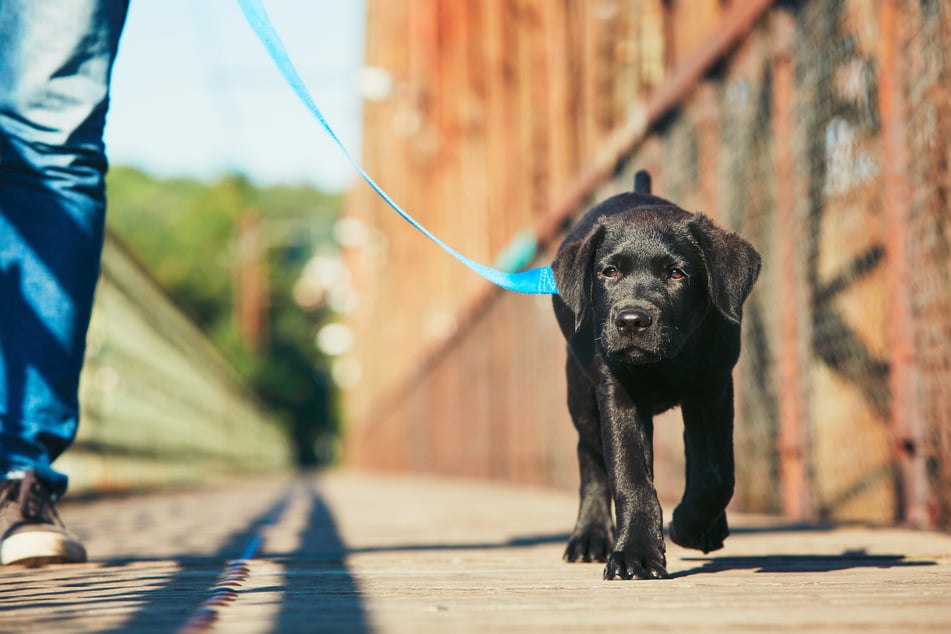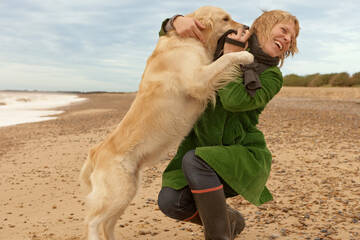Why your dog barks at other dogs – and what you should do to help
It's not always so easy to take a relaxed stroll with your pooch. Sometimes the little dude can get so loud, it prompts you to question your life choices. So why do dogs bark at each other, and how can you get them to calm down when things get ruff?

All dogs bark. Even if it's a little irritating at times, it's completely normal – and perfectly healthy.
Like humans, our canine companions need to communicate their needs and feelings from time to time, but that doesn't mean it's easy to put up with the noise.
Honestly, we're all familiar with a neighbor's dog who incessantly barks, howling till the sun goes down. It can be a real pain, and something their owner might not know how to deal with.
Dog barking might be normal, but understanding a pup's reasons and needs is important. In this Dog Guide, we'll explain why dogs bark and what you can do to help.
Why do dogs bark at each other?

There are more reasons for a dog to be barking at another dog than you could ever hope to shake a stick at. Here are a few:
- Fear and insecurity: If your dog has lived a life full of love and fun, it might not be used to things going wrong. As a result, your dog might bark like a madman as a protective or defensive response to stress.
- Aggressiveness: We've all met that dude at the pub who gets just a little too aggressive sometimes. Dogs can be the same, minus the alcohol – and barking is a symptom of this behavior.
- Protective instinct: Dogs instinctively protect their human, even when it isn't really necessary. It wants to protect its family, and will bark at anything or anyone it thinks might be a risk.
- Dominant behavior: Dogs like to dominate other dogs. Barking might also be paired with mounting, with your pooch trying rather hard to prove itself as the alpha-dog.
- Excess energy: Dogs are often rather busy and curious. If your dog hasn't been particularly active, and has perhaps developed a load of pent-up energy, it's going to need to let off steam. What will they do? They'll bark their little heads off!
- Separation anxiety: If you leave your dog alone regularly and it hasn't been adequately trained, it may have separation anxiety. Here's how to help.
- Lack of socialization: Has your dog been inadequately trained? Barking at other dogs could be a lack of training, or not being used to being around other dogs.
- Sexual frustration: Doggos can be horny devils. In fact, if they have a lot of sexual frustration pent-up over months of inactivity, they might take out their annoyance through barking louder than a pick-up truck screeching to a halt.
- Pain: Is your dog in pain? This can also trigger pups to bark incessantly. If it is unusual and constant, it may be time to take your fluffy friend to the veterinarian.
Different dogs bark for different reasons, depending on their breed, age, education, and temperament. Get to know your doggo so that you can figure out the cause of your dog's barking, and develop a solution.
What to do when your dog barks at other dogs

Is your dog barking like a mad-man who's had a few too many coffees? Does it happen every time it sees another pooch? Do you want it to stop?
Breaking your dog's barking habits can be tricky, and requires consistency and dedication, but here are a few methods to try out:
Tip 1: Variety
Dogs should be offered as much variety as possible. That means different kinds of food, different routes on its walk, different tasks, and problems to solve. Whatever you can do to reduce its boredom. If these four-legged friends feel fulfilled, they're less likely to bark at other dogs.
Tip 2: Show authority
It's important for your dog to see you as the alpha in your pack. Show dominance, show authority, show your dog that you are the one who should be listened to. Give your dog clear commands, train it well, and get it to the point where it understands your directions and will listen to you.
Tip 3: Keep them busy
Keep your dog busy with regular exercise that'll get rid of any excess energy it may have built up. Do this by playing games with your dog regularly, doing command training, or going on walks often. If your dog is well-trained, it can help combat boredom and reduce barking.
Tip 4: Show calm leash control and relaxed vibes
When walking your dog, make sure that your leash control and general stature is calm. Your buddy will feel your anxiety and will understand if you feel threatened or in danger. And it will act accordingly. Stay calm on walks and your dog is less likely to bark at other dogs.
Tip 5: Self-confident behavior
Your dog will feel rather protective of you and your family. As a result, it will try to protect you from other dogs, soliciting a lot of barking. Want to avoid this? Make sure you are self-confident and that you maintain your pace. Try not to focus your energy on dogs passing by – and there's less of a chance your dog will.
Instead of responding to negative behavior in your dog, it's important to maximize positive reinforcement. Reward it for good and calm behavior.
How to stop dog lunging
There are many reasons why your little buddy might feel the need to lunge at people or other dogs.
Like barking, it can be a real annoyance – and sometimes a safety issue. But usually dogs' lunging and jumping up comes from an innocent place. Perhaps your doggo is feeling a little territorial, or perhaps it's just a happy pooch that wants everyone to share in its joy.
Either way, though, it is important to step in and teach your dog that this behavior isn't cool. After all, you want your fluffy fellow to be an integrated member of dog society, don't you? Also, fellow dog owners might not be so cool with your dog lunging, either.
Here's how to stop your pooch from lunging and jumping:
- Make sure that your dog is made to "sit" (so, has also been trained to "sit") before something comes close by that might cause it to lunge.
- Distract your dog with things that it enjoys, and make sure that it's well-trained.
- Hold tightly to your dog's leash to prevent them from lunging, and have your dog learn commands like "down."
- Reward your dog for not lunging.
Lunging comes from a dog who hasn't been trained well, as sometimes incessant barking can be, so it's a good idea to make sure that your dog is obedient. Remember, acting like the alpha will be helpful for both you and your pup.
Dog barks at other dogs: Tips & Tricks
Dogs will bark at other dogs from time to time, which is just normal. What's important is that you limit the amount of barking that goes on, and improve your pooch's overall behavior through positive reinforcement and training.
Here are a couple of other tips and tricks to consider:
- Tip 1: Get the help of an expert if you have no success using the methods we described above. Remember that your veterinarian isn't the only person who can help, and consider going to trainers and dog therapists if needed.
- Tip 2: Remember to signal to other dog owners that they should keep their distance, if you feel it's necessary. A yellow tag on the collar will signal to another dog owner that they should stay away.
Why do dogs bark at other dogs? A round-up!
Dogs bark at each other for a huge variety of different reasons. Maybe your pooch is stressed, maybe it is sick, maybe it is just excited to see another canine companion. This is all very normal, so try not to worry too much!
Often there are several reasons why your dog keeps barking at other dogs. Make sure to observe your pet closely, apply the strategies above, and see a vet if you feel that something is off. Stay calm, patient, and try to work through your dog's excitement with a lot of love.
Cover photo: 123RF / madrabothair




